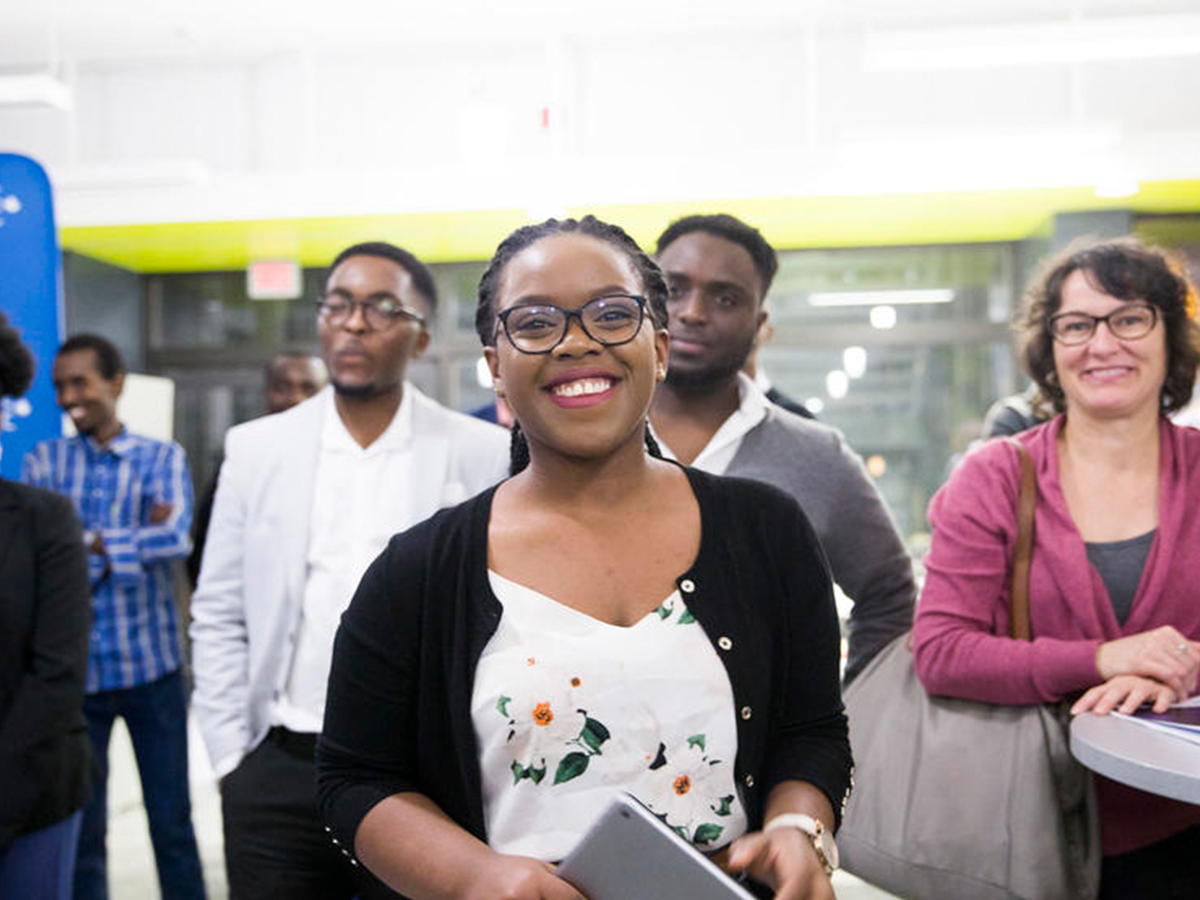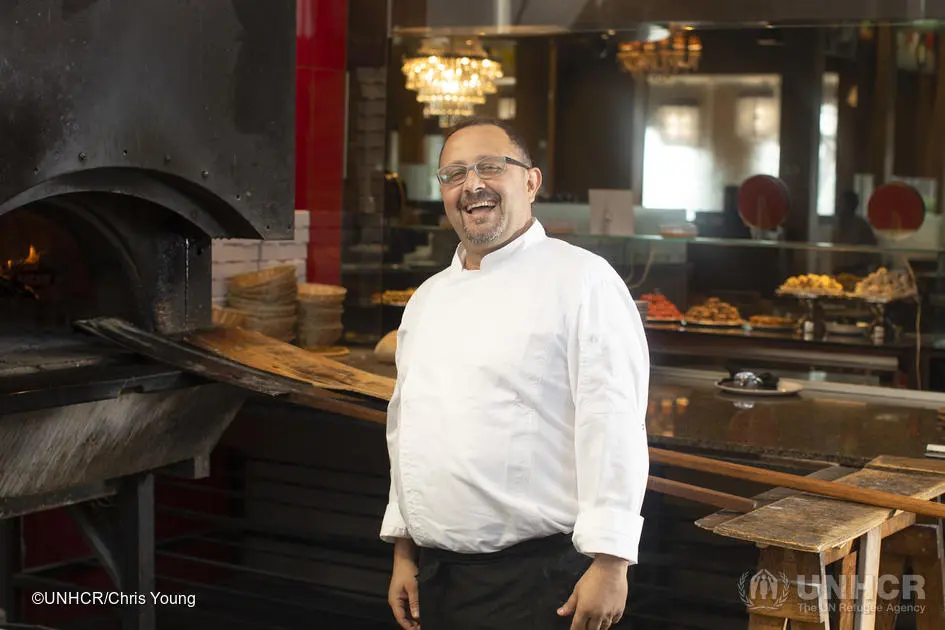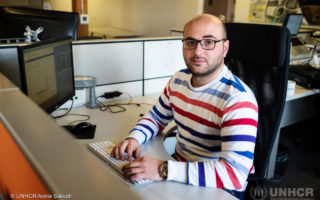
Amelie Fabian (centre) spoke about her experience of leaving Rwanda and seeking asylum in Malawi before being resettled in Canada in 2017. She was part of the 2014 Student Refugee Program (SRP) cohort. © UNHCR/Michelle Siu
By Jean-Nicolas Beuze, UNHCR Representative in Canada
Every year, we publish new statistics about the world’s forcibly displaced. And every year, we break a record. There has never been so many families running for their lives from wars and persecution. The accuracy of such data is – rightly so – debated as we started counting only during the second half of the last century. Some refugees will always remain unaccounted for, as they die attempting to cross deserts, seas, if not frontlines, or live hidden in unfriendly communities. But these record numbers send the wrong signal. They portray the refugee situation as a never-ending crisis. Ironically, they often actually feed populist discourses about Western societies being overwhelmed by refugees.
There has never been so many families running for their lives from wars and persecution.
Humanitarian actors, such as UNHCR, the UN Refugee Agency, need these numbers to plan their response: how many vaccines, how many kids to put in schools, or how many shelters for rape survivors? In turn, donors – mostly governments – need them to allocate funding to these life-saving services. Last week, the humanitarian partners – United Nations and non-governmental relief organizations – released their global humanitarian appeal: CAD 37.9 billion to assist more than 108 million people in 2020. While the numbers of those in need keep growing, the funding does not keep pace.
This is why new approaches and partners must come into play. Governments that provide most of international aid must get support from others. And Canada has two unique initiatives that are making a difference.
First, Canada has successfully tested a win-win economic approach to matching skilled refugees overseas with Canadian employers looking to recruit for hard-to-fill positions. Two partners, Talent Beyond Boundaries (TBB) and RefugePoint, support Canadian employers to identify refugees in Jordan, Lebanon and Kenya who have the requisite skills and professional experience to compete for jobs and economic immigration.
While some 30,000 refugees per year are admitted in Canada on humanitarian grounds, the country brings close to 200,000 skilled immigrants to sustain its economic growth – and Canadian business leaders have called for much higher numbers. Instead of looking at refugees as people in need of our compassion only, this approach recognizes that refugees have careers and skills that are needed in the work force here. Already, a software developer, a culinary chef, and a tool and die maker – all refugees – have made Canada home alongside their families.

Originally from Damascus, Nabil Maati was the first refugee to be placed in Toronto for training as part of a pilot project run by Talent Beyond Boundaries (TBB), connecting skilled refugees with global employers. © UNHCR/Chris Young
Employers hired them after rigorous job interviews and careful review of their qualifications, because they were the best match for the business – not out of sympathy. These employers and many more across Canada have found talented workers to fill in-demand positions and, through this purpose-driven hiring, have provided a lifeline for refugees to rebuild. They now value these refugees’ commitment to their jobs, and have been praised by other employees for having done something good for humanity. No doubt that their patrons will also pay attention as nowadays consumers expect businesses to uphold certain ethics.
Only three percent of refugees have access to higher education.
Second, only three percent of refugees have access to higher education – in comparison to 37 percent amongst youths globally. The discrimination is blatant and linked to tuition fees, gender and language barriers, lack of proper documentation or simply the reality that many refugee youths must give up their education to work and help their families make ends meet. Since 1978, Canadian students – from colleges and universities – get together, and through their student fees, sponsor refugees to study here.
This program run by World University Service Canada (WUSC) in over 95 campuses benefited 130 refugees last year – while 572,000 foreigners came as students. Whether they return home to rebuild their country or establish themselves in Canada at the end of their studies, these youths will no doubt remember that Canada gave them this opportunity, thus helping build bridges between economies and societies.
The numbers say it all: more refugees, less money to help them, but plenty of opportunities to get many more talented refugees to Canada. More than 21 years in the field have taught me that talents amongst refugees are plentiful.
Empathy must continue to drive us to help less fortunate fellow human beings.
Empathy must continue to drive us to help less fortunate fellow human beings. Adding an economic or an academic dimension to the solutions available to us opens exciting prospects, not least because it changes the narrative on refugees.
These initiatives unique to Canada empower each of us to play a role in building stronger and more inclusive communities. We now need to grow the numbers in Canada, and to replicate them in other countries. WUSC and TBB will bring this message to Geneva next week where the world will gather at the first Global Refugee Forum to re-think the best – and most innovative – ways to build refugees’ own resilience.
At the Forum, together with over 70 of their campus groups, WUSC is pledging to get more refugees come and study in Canada over the next four years by increasing the number of students sponsored by each campus and mobilizing new campuses. Canadian good practices will also be shared with other countries so that they join the movement of offering higher education to refugees. On its side, TBB will showcase the commitment of 21 pioneering employers that have committed to consider the global refugee talent pool in their international recruitment, and six industry networks backing this strategy.
Let’s not be daunted by numbers: solutions exist and Canada knows them.





